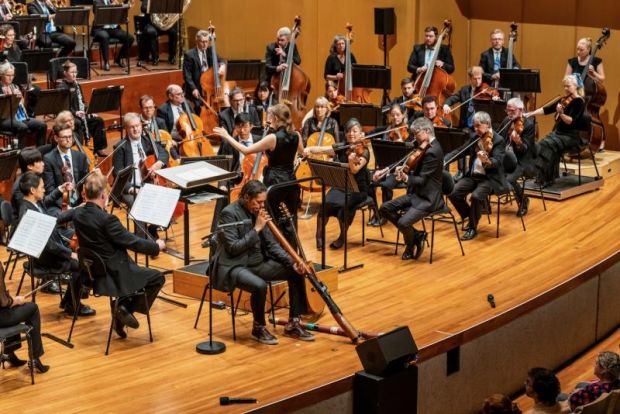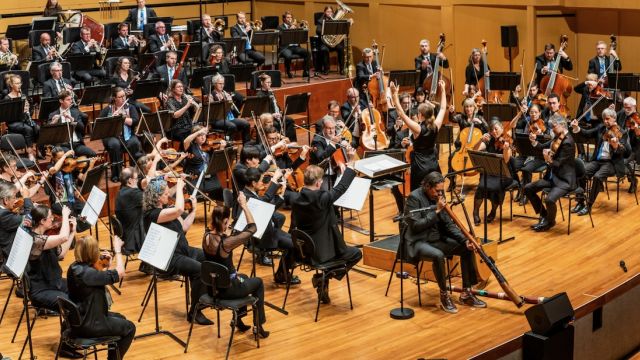Dreams & Stories
An almost full-house greeted the QSO and guests for the next segment of the ever-popular annual Music on Sunday series. With a diverse and choice program, including guests Australia's William Barton on the didgeridoo and internationally renowned Austrian Katharina Wincor as conductor, there was enough material to please most fans of the orchestra and orchestral sound, in particular, in this instance, those works that connect with the theatre and cinematic art forms.
The concert also included an original composition by William Barton, 'Sky Songs', in collaboration with other Indigenous players and the orchestra, following Peter Sculthorpe’s 'Kakadu', well-known for its illustrious portrait of Australia's landscape and by using a unique combination of tonality and orchestral colour. More mesmerizing was William's opening Indigenous-style vocal solo from the audience as he made his way to the stage, a piece written when he was in his teens, evoking a real 'shimmer' down one's spine. It brought tears to my eyes.

Included with the concert were introductions between sets from popular Queensland performer Ashleigh Denning, even an interesting discussion with the guest conductor over Johann Strauss's famous 'Tales from the Vienna Woods' and also the popular folk instrument of the era, the zither. Apart from the use of the ever-popular waltz, this work exudes the qualities of a tone poem, again evoking the spirit of the landscape, all part of the theme of this well-chosen concert program.
I never tire of Mendelssohn's music with its fresh, melodic nature, and his overture for A Midsummer Night's Dream, one of my favourites and also written in the composer's teens, is no exception. This was a flawless, animated and touching performance.
But what can really stun the senses in live surrounds is a demonstration of the art of the orchestrator; and so it was with the final two works on the program that brought to light a profession that is often overlooked by the general public. Composer John Williams worked with a number of orchestrators throughout his career, though he is known to do most of the work in his sketches, and the sheer tour-de-force of an orchestra's potential was in full-flood with the performance of an excerpt from one of his Harry Potter scores.

Stravinsky also rose to fame not only because of his avant-garde harmonic and contrapuntal compositional style, but also because of the enigmatic colour of his orchestrations. It was therefore a fitting choice to finish the concert with one the most famous examples of his unique talent, 'Firebird Suite' (1919 version).
Under the guiding baton of a very gifted guest conductor who overcame the challenges of a difficult program with easeful grace, the QSO maintained its international reputation with a high standard of musicianship, all well received by an enthusiastic audience who appeared to be thirsting for more. These sets of concerts continue to bring sunshine to a Sunday morning, no matter the weather, and are always worth a visit.
To include words from the QSO's promo team, imagination did indeed take flight!
Brian Adamson
Photographer: Darren Thomas.
Subscribe to our E-Newsletter, buy our latest print edition or find a Performing Arts book at Book Nook.

